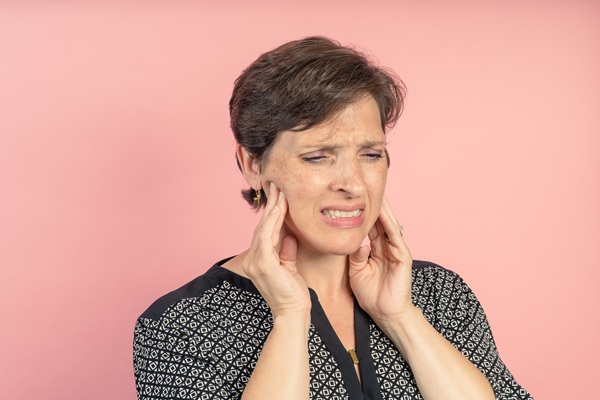What are TMJ Symptoms?

TMJ disorder occurs when the temporomandibular joint is injured or overworked. The joint is responsible for connecting the skull and the jawbone, and it plays an important role in the jaw movement. When TMJ disorder develops, symptoms develop and can worsen without appropriate treatment.
A detailed review of TMJ symptoms
There are many different symptoms of TMJ disorder, but some TMJ symptoms are more common than others. Four of the more commonly reported symptoms of TMJ include jaw pain and soreness, stiff or locked jaw, chronic ear pain and a clicking sound in the jaw.
Jaw pain and soreness
Jaw pain is perhaps the most common symptom of TMJ disorder. This is because the TMJ plays a direct role in the function of the jaw. When the joint becomes injured, then the jaw has a harder time functioning properly, which can lead to pain. Jaw soreness is also common, especially if the cause of TMJ disorder is teeth grinding. This is because the jaw becomes worn-down and overworked, leading to the jaw feeling weak and sore.
Stiff or locked jaw
Stiff or locked jaw occurs when the temporomandibular joints become locked. This can also lead to other symptoms as well, such as difficulty chewing. The severity of this symptom varies. Minor stiffness is not a huge concern, but a locked jaw that is difficult or impossible to open requires prompt attention from a dentist. There are several ways a dentist can treat this symptom. They may seek to relieve inflammation and soreness through anti-inflammatory medication, along with ensuring the jaw is protected by wearing a mouthguard at night.
Chronic ear pain
TMJ disorder affects more than just the jaw. The pain can also spread to the ear and other parts of the face as well. When this occurs, it is a sign that the TMJ disorder is more serious and requires diagnosis and treatment from a dentist. More severe instances may also affect the person’s ability to hear, and there may also be a popping sound in the ear and pain in the temple area.
Clicking sound in the jaw
The dentist will likely check to see if there is a clicking sound in the jaw when diagnosing patients who show other symptoms of TMJ disorder. A jaw may produce a clicking sound while opening and closing due to injury or soreness of the temporomandibular joint. Although this symptom is not overly severe, it does often suggest a trip to the dentist for diagnosis and treatment is necessary as it is a sign of a larger concern. Without prompt treatment, TMJ disorder can grow worse and make the treatment more invasive and expensive.
Receive a TMJ diagnosis from an experienced dentist
If you have symptoms of TMJ disorder and want to arrange a consultation visit with an experienced dentist, then reach out to our friendly dental team today. We are glad to help you with an accurate diagnosis of your symptoms as well as explaining all available treatment options so that you can make an informed decision.
Request an appointment here: https://dumontfamilydental.com or call Dumont Family Dental at (201) 374-7202 for an appointment in our Dumont office.
Check out what others are saying about our dental services on Yelp: TMJ Dentist in Dumont, NJ.
Related Posts
Many people wonder when to call an emergency dentist for cuts, tears, or bites to the lips, cheeks, tongue, and gums. While these soft tissue injuries can look scary, prompt dental care can protect comfort, reduce infection risk, and save teeth. A general or family dentist who handles urgent cases can guide this care right…
Dental implant restoration is a reliable and long-lasting solution for replacing missing teeth. However, caring for and maintaining your dental implant from the start is important to get the best results. A consistent oral hygiene routine and regular dental visits are necessary to protect this investment in your long-term oral health.Brushing and flossing are essential…
Implant-supported dentures deliver stable chewing, confident speech, and a natural appearance for patients who struggle with loose plates or frequent sore spots. This approach anchors a full arch to dental implants, creating a secure foundation that resists slipping during meals and conversations. With careful planning, the treatment protects bone health, restores balanced bite forces, and…
Teeth whitening is a popular cosmetic dental treatment. This procedure can effectively brighten your smile by addressing discoloration and stains. By understanding how teeth whitening targets stains, you can see how the process can restore your teeth to a cleaner and more youthful appearance.Tooth discoloration can occur for several reasons, and identifying the source is…
